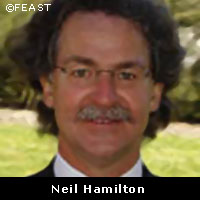EU-Australian collaboration: could do better, says FEAST Executive Director
Australia's participation in the EU's framework programmes for research has increased steadily since the Fourth Framework Programme (FP4), but is still lower than it should be, according to Neil Hamilton, Executive Director of the Forum for European-Australian Science and Technology Cooperation (FEAST). By FP6, 70 Australian teams were participating in 57 projects (July 2006 statistics), but this number should be between 100 and 150, Mr Hamilton believes. In Brussels for FEAST, the Executive Director spoke to CORDIS News about European-Australian cooperation, what FEAST has achieved, and where the barriers to cooperation lie. 'The real success of FEAST has been due to engagement with the Australian research community,' says Mr Hamilton. 'Australian researchers are beginning to understand that collaboration is not about money, but about access to infrastructure and ideas.' FEAST started as a pilot project in 2001, and was run as a one-man-show. The pilot project organised conferences and 'started the process of educating the Australian research community', says Mr Hamilton. It also paid for 30 Australians to attend the launch of FP6, and thus created Australia's first information multipliers on the framework programmes. A review at the end of the pilot project concluded that the initiative was under-funded, and the result was a renewed contract with more money under the International Cooperation section of FP6. FEAST's work programme has three pillars: information dissemination, networking support and concrete activities such as conference organisation. 'There are an infinite number of things that you can do, but you have to work out which are best,' says Mr Hamilton. Something he did not appreciate when he wrote the proposal for funding was how much time he would need to spend in Europe in order to make FEAST work. 'Being here is crucial. I spend three months per year here and it's only because of that that it works,' he says. FEAST's Executive Director believes that neither Australian Government policy nor EU policy are adequate or favourable towards Australian participation in the framework programmes. He also sees less room for participation by developed countries with Science and Technology (S&T) Agreements in FP7 than in the past, believing that the Commission instead favours the involvement of researchers from developing countries. 'Until that's sorted, European science will be harmed. If you want to be the best in the world you have to work with the best in the world,' he claims. The lack of national funding can also be a barrier to participation, although Mr Hamilton is hopeful that funding may become more readily available within the next year. The Prime Minister's Science, Engineering and Innovation Council is currently completing a report on collaboration with Europe that will be presented to the Prime Minister. Previous reports on collaboration with India and China led to more funds being made available nationally. 'Australia is a small country and a knowledge-taker. We need more money or we will go backwards,' worries Mr Hamilton. But increased collaboration is not all about money. Researchers themselves in both hemispheres must actively pursue partnerships if they wish to work together. On the Australian side, there is a clear interest in working with European scientists, as evidenced by the high attendance at FEAST workshops. 'Where we fall down is we're not seeing the follow-through with these people,' says Mr Hamilton. He would like to see more Australian researchers asking their counterparts in Europe, with whom they are already working, whether they are planning to submit a proposal under FP7 so that they know about others' plans in good time and are able to demonstrate where they could contribute. FEAST would also like to see Australians proactively seeking information on how to participate in the framework programmes. Researchers rarely contact the FEAST helpdesk with questions, but the 'frequently asked questions' service on the FEAST website gets thousands of hits. 'I think that scientists don't like to appear ignorant!' says Mr Hamilton. He also blames misinformation on both sides for low FP6 participation levels. The Australian research community must have enough knowledge to be able to correct European research teams who do not think that Australians are able to participate in the framework programmes, he says. Mr Hamilton also thinks that there are opportunities that the Australian research community is not picking up on because it is thinking 'straight science'. More could be done to take European scientists to Australia. 'Those that do come over say: 'wow, we didn't know what you were doing over here.' Lots of people go to Australia and end up staying, and they are the key link back to Europe,' says Mr Hamilton. Having a scheme similar to ERA-link in Australia would make a great deal of sense, he concedes. ERA-link is a network bringing together European researchers based in the US. There is still much more to do to strengthen EU-Australian collaboration, and the intention is that FEAST will continue its mission to do just this under FP7. The FEAST team will submit a proposal once the Commission call is published in May.
Countries
Australia



